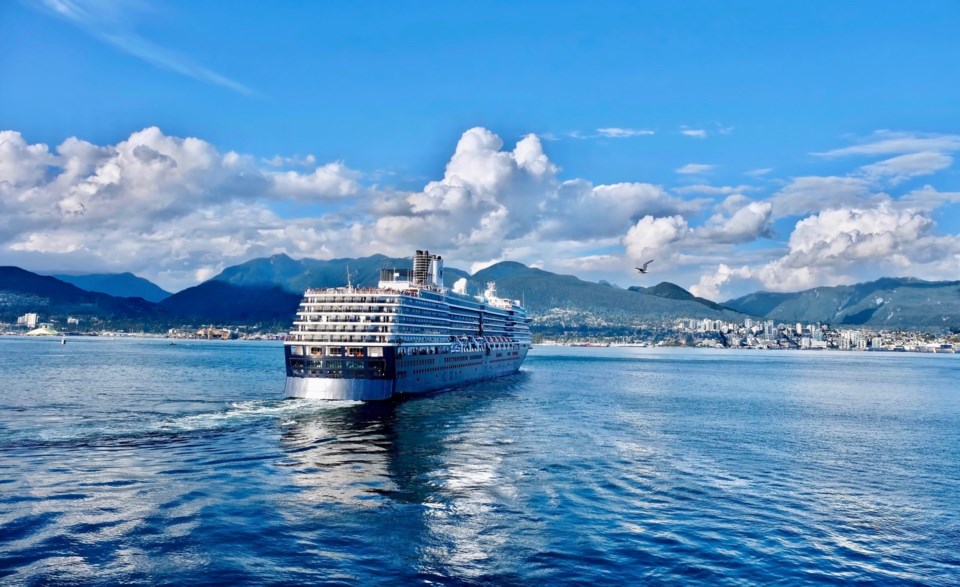B.C. Premier John Horgan finds himself between a rock and a hard place on the issue of protecting the province’s lucrative cruise ship sector, amid the ongoing pandemic and a strong American push to cut off stops to this province.
The premier was copied on a letter from an Alaskan congressional delegation last month, chastising the Canadian government for banning international cruise ship travel until February 2022 without consulting American officials.
Horgan didn’t have anything to do with it; the border and maritime waters has, and always will be, the domain of the federal government.
But B.C. stands to potentially lose a fair amount of money in the dispute.
The province saw almost $3 billion in economic benefits from hundreds of cruise ship visits to Victoria, Vancouver and Prince Rupert in 2019. Entire sectors of the provincial economy are dependent on international cruise travel, the American tourists it brings, and the spinoff effects through local businesses.
That’s now in jeopardy.
The Alaska delegation has introduced a bill into the U.S. Congress that would relieve the cruise industry from a legal requirement to stop at Canadian ports while running between Seattle and Alaska.
It’s a little-known fact that U.S. maritime law requires foreign-operated cruise ships to stop in B.C. on the way to Alaska. The purpose was to protect American-made vessels, run by entirely American crews. But almost no American cruise ships qualify, and so they are legally required to stop in Canadian ports, or face stiff fines.
The congressional bill proposes to temporarily waive that law, allowing direct service between Seattle and Alaska, cutting out Canada.
The reason is simple: The United States is far ahead of Canada in vaccinating its population from COVID-19.
The cruise ship sector hopes to be up and running in May, with the potential to salvage the summer season. Canada, meanwhile, is sticking to its ban, which runs until February 2022.
Cruise ships definitely won’t be welcome in B.C. ports this year, Provincial Health Officer Dr. Bonnie Henry said last week. Horgan can’t, and won’t, go against that advice.
That’s left the U.S. sector in a conundrum of having to try and dock in Canadian ports that will be closed to them.
B.C.’s tourism sector is worried that once the Americans give themselves temporary permission to skip Canada, the cruise ship industry may increasingly choose to do so once COVID-19 is over, or even make the change permanent.
That would devastate cities like Victoria, where everything from horse-drawn carriages to the tourist-trap Government Street clothing stores depend on international cruise ship traffic.
The Opposition B.C. Liberals brought the issue up in the house Tuesday, demanding to know what the provincial government’s plan is to tackle the issue. It was a good topic, with good questions from the critics.
Tourism Minister Melanie Mark tried to deflect her way through the answers, but it was clear early on that her ministry hasn’t done much on the file.
That’s partly understandable, in some ways. B.C. has a lot on its plate, rolling out the largest mass immunization plan in its history.
But Mark runs an entire ministry solely dedicated to tourism, which needs to take a long-term view to what cruise ships will look like after the pandemic. It’s possible to do that work, in conjunction with the vaccination efforts.
Premier Horgan speaks weekly to Prime Minister Justin Trudeau, and that too would be a good place for him to raise the subject. Does Ottawa really intend to hold tight to the February 2022 ban on international cruise ships, or if most of the country is vaccinated by this summer, could the ban lift early? And if it’s possible, who is signalling this to the tourism sector and our American neighbours?
It’s not clear if the U.S. Congress will pass the Alaskan-sponsored cruise ship bill. It’s currently been sent to a working committee.
In the meantime, the cruise sector has proposed an alternative: Allow its ships to drop anchor off B.C.’s coast briefly on their way to Alaska later this year, conduct a special virtual immigration session that satisfies the American legal requirements, and let the ships carry on their way until such time as the Canadian towns and cities are ready to let them dock.
It’s not a bad idea. Though, if something went wrong on one of those ships while it was travelling off of B.C.’s coast - a disaster or medical emergency - the province and federal government would still be obliged to help, potentially having to evacuate passengers and bringing Americans to shore for medical treatment if necessary.
It’s a risk, for sure.
But the cruise ship sector is an economic backbone of several coastal communities in B.C.
Those communities have already been hard hit by the pandemic.
It’s worth B.C. and Ottawa carving out a bit of time and effort to try and work with the Americans to find a solution, before the United States cuts us out of the picture altogether.
Rob Shaw has spent more than 13 years covering BC politics, now reporting for CHEK News and writing for The Orca. He is the co-author of the national best-selling book A Matter of Confidence, and a regular guest on CBC Radio.
SWIM ON:
- By introducing ‘experts’ with dubious credibility, Rob Shaw says a group of churches challenging restrictions on in-person religious services did themselves no favours.
- The pandemic has pushed BC's tourism industry to the very brink. If it’s going to make it to the other side, Ada Slivinski government needs to step in with a plan.
- If you do any BC travel this year, may we recommend the Fraser River, and the opportunity to see the site(s) of the beguiling story of the Alexandra Bridge Controversy, as told by the inimitable Daniel Marshall.



